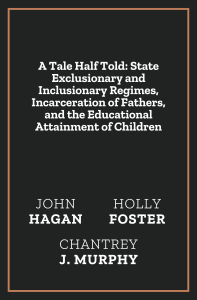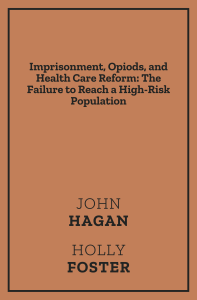Holly Foster (she/her) is a Professor of Sociology and a Chancellor EDGES Fellow at Texas A&M University. Her research interests include parental incarceration, justice reform, crime, personal criminal-legal system contacts, violence exposure, the life course, social inequality, and health. Her research relies on quantitative and mixed methods. At Texas A&M University, she teaches courses on criminology, social problems, gender and crime, juvenile delinquency, crime, punishment, the life course, and other topics.
In a forthcoming book, set to be published by NYU press, Foster argues the social exclusion of women in prison works through the prison-family interface, leading to disparities which reinforce the patterns of racialized social inequality already existing in processes of mass incarceration. Foster is at work on a second book, a mixed-methods project which investigates the rights of children of incarcerated parents from the perspectives of multiple stakeholders, including the children themselves, with myriad implications for justice reform efforts.
Foster is continuing work on a long-standing collaboration with John Hagan, a Professor Emeritus at Northwestern University and a Research Professor Emeritus at the American Bar Foundation. Using the multi-wave National Longitudinal Study on Adolescent to Adult Health, their collaboration investigates the myriad influences of parental incarceration and personal justice system contacts on educational and health outcomes over the life course. Of particular interest to this research are the influences of criminal-legal system contacts on a person’s social exclusion—their disconnection from major social institutions such as schools, housing, civic participation, or healthcare—over the life course.
In another collaborative research project with Jeanne Brooks-Gunn, the Virginia and Leonard Marx Professor of Child Development at Teachers College and the College of Physicians and Surgeons at Columbia University, Foster uses the Project on Human Development in Chicago Neighborhoods survey data to analyze the correlates and consequences of children’s and adults’ exposure to violence. This project considers both direct victimization of violence and indirect exposures to violence, such as being a witness to violence. By analyzing and considering a wide range of outcomes, Foster and her collaborators consider how violence exposure and re-exposure can be prevented, and how the health and personal consequences of this exposure can be minimized later in life.
Foster’s research has appeared in American Sociological Review, Social Forces, Social Problems, Annual Review of Sociology, Journal of Health and Social Behavior, Sociology of Education, Social Science and Medicine, and Law and Society Review, among other journals.
In the 2024-2025 academic year, Foster is the Chair-Elect of the Crime, Law, and Deviance Section of the American Sociological Association. She also serves as a board member of a non-profit association working with incarcerated women and their children through a literacy project.



